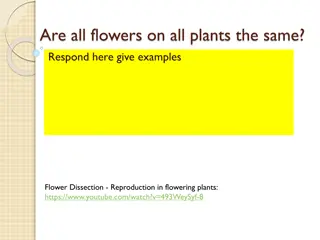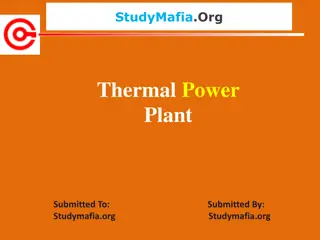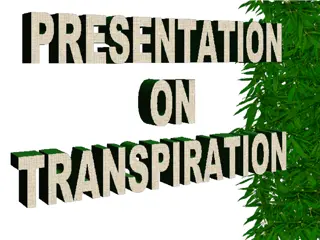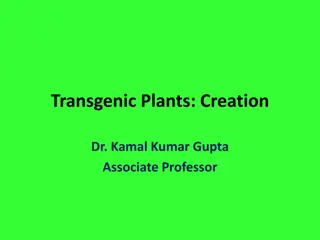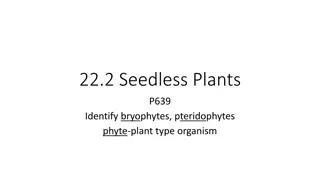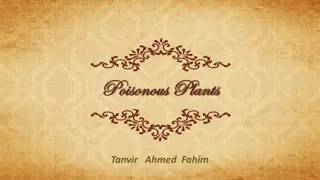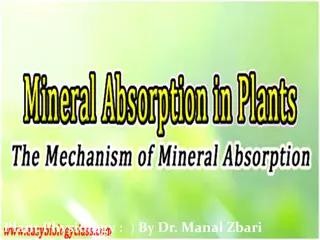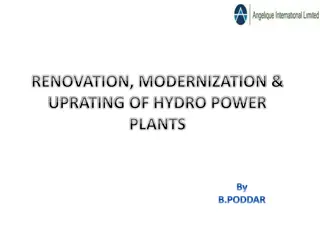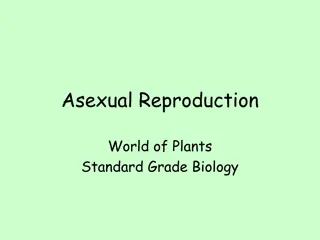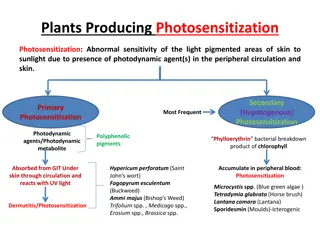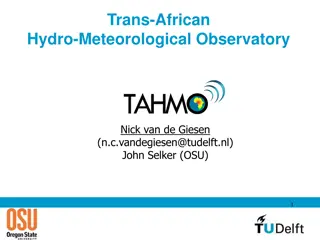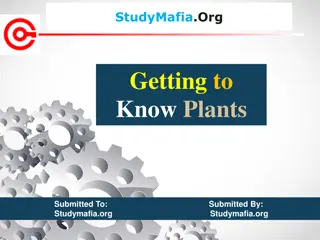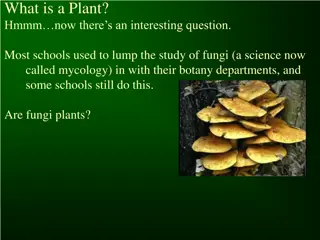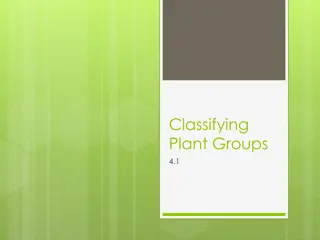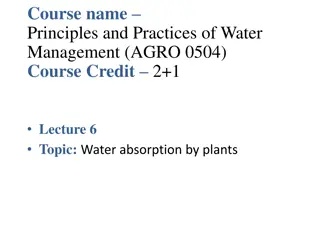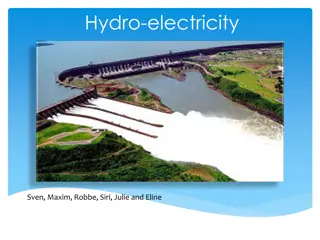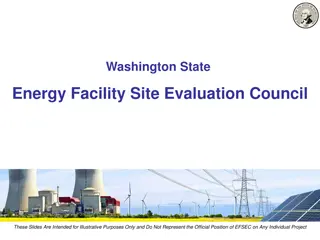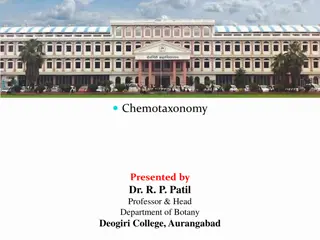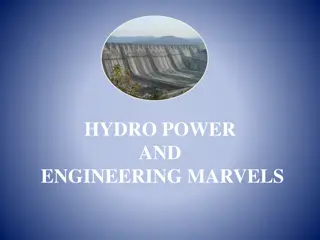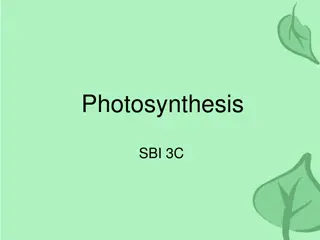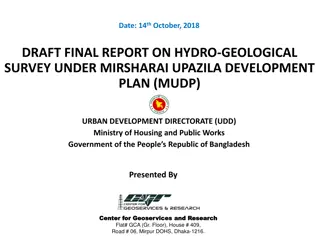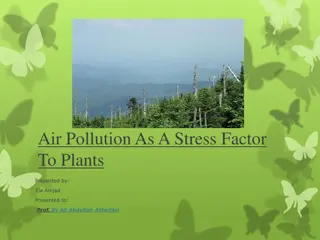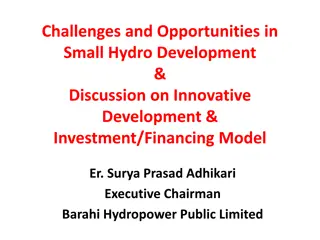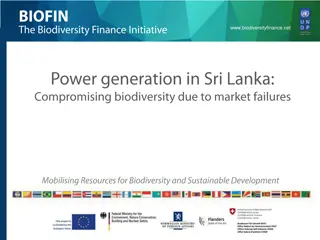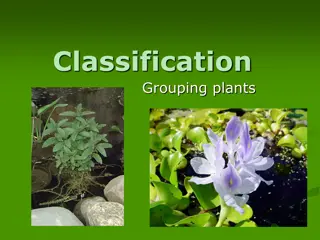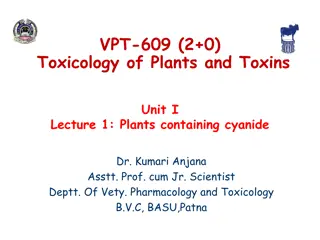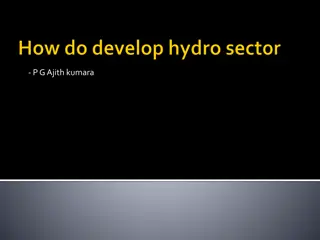Energy Production
Explore different aspects of energy production and efficiency in thermal power plants, water heaters, coal-fired electrical generation plants, and natural gas electrical generation plants. Learn about energy density, mass calculations, overall efficiencies, and specific energy requirements in these
7 views • 57 slides
Volatile Oils in Pharmacognosy and Phytochemistry: Composition, Chemistry, Uses
Volatile oils, also known as essential oils, are derived from terpenes and their oxygenated compounds. These oils possess characteristic odors and are extracted from plants through various methods like hydro-distillation and steam distillation. They are commonly used as flavoring agents, perfumes, a
0 views • 29 slides
Understanding Flower Variations in Plants
Explore the diverse world of flowers in plants through examples and explanations of their reproductive parts and processes. Discover how some plants have both male and female flowers, while others have separate sex flowers. Learn about perfect flowers, the female and male parts of a flower, and the
0 views • 12 slides
Understanding Thermal Power Plants: Overview and Operation
Thermal power plants play a crucial role in converting heat energy into electricity for various applications. This article covers the definition, layout, working principle, and components of thermal power plants, highlighting their advantages and top features. From converting heat into mechanical po
0 views • 20 slides
Understanding Transpiration and Gas Exchange in Plants
Transpiration is the evaporation of water from plants, mainly occurring through the leaves' stomata. Plants exchange gases like CO2 and O2 through various parts, without specialized organs. The process aids in photosynthesis, respiration, and cooling, demonstrating the importance of transpiration in
0 views • 22 slides
Understanding Transgenic Plants and Agrobacterium Tumefaciens in Plant Biotechnology
Creation of transgenic plants involves various methods such as microprojectile DNA-coating, electroporation, and Agrobacterium transformation. Agrobacterium tumefaciens, a soil bacterium, plays a crucial role in inducing crown gall disease in plants by transferring T-DNA from the Ti plasmid. The Ti
1 views • 27 slides
Understanding Seedless Plants: Bryophytes and Pteridophytes
Explore the world of seedless plants through bryophytes and pteridophytes. Learn about the characteristics of green algae, the life cycles of these plants, and how vascular tissue impacts their growth. Discover the limitations and importance of vascular tissue in plants, from the small yet significa
0 views • 8 slides
Upper Thames Hydro Project Updates and Next Steps
The Upper Thames Hydro project aims to install hydropower turbines at 4 weirs on the upper Thames to generate electricity for local use and contribute to the grid. The project has achieved a positive feasibility study, outlined plans, engaged with local stakeholders, and obtained guidance from relev
0 views • 6 slides
Understanding Thermal Power Plants in India
Explore the significance of thermal power plants in India, focusing on their generation capacity, coal-based operations, and key players like NTPC. Learn about the principles, layouts, waste management, and power output of these plants. Dive into a list of major thermal power plants across the count
0 views • 21 slides
Understanding Poisonous Plants and Their Effects on Humans
Poisonous plants can have deleterious effects on individuals, leading to severe consequences and even death if not managed properly. These plants produce toxins that interfere with the body's essential functions, ultimately causing impairment and potential fatality. Recognizing the grades of poisoni
0 views • 11 slides
State of Power Decarbonization and Resource Planning in Q1 2023
In Q1 2023, there was no recent action on power decarbonization and resource planning by 47 states plus DC & PR. The activity ranged from no action to 10 or more actions in terms of power decarbonization and resource planning. The greatest contributing resources to the state generation mix in 2022 w
0 views • 16 slides
Understanding Food Sources: Plants and Animals Explained
Food is essential for nourishing our bodies, and it comes from either plants or animals. Plants provide fruits, vegetables, grains, and more, while animals offer products like meat, milk, and eggs. Different parts of plants, such as roots, stems, and leaves, are consumed as food. Animals have varied
0 views • 11 slides
Mineral Absorption in Plants: Mechanisms and Types
Plants absorb minerals from the soil as ions through the roots, with the process of mineral absorption being distinct from water absorption. Mineral absorption in plants can occur through passive or active methods, each involving different mechanisms and energy requirements. Passive absorption is a
0 views • 14 slides
Renovation, Modernization, and Uprating of Hydro Power Plants
The renovation, modernization, and uprating of hydro power plants involve enhancing efficiency, output, and reliability of aging assets through implementing latest technology. Factors such as service conditions, stress levels, and maintenance standards significantly impact the life expectancy of hyd
0 views • 19 slides
Asexual Reproduction in Plants: Methods and Examples
Asexual reproduction in plants, also known as vegetative propagation, involves various methods such as tubers, bulbs, and runners. It allows plants to reproduce without the involvement of sex cells and fertilization, resulting in genetically identical offspring. Artificial propagation techniques lik
0 views • 11 slides
Understanding Photosensitization in Plants: Causes and Toxicity
Photosensitization in plants can lead to abnormal skin sensitivity to sunlight, caused by the presence of photodynamic agents in the skin and peripheral circulation. Primary and secondary photosensitization are common, with various plants and toxins contributing to liver damage and biliary occlusion
0 views • 12 slides
Innovations in Hydro-Meteorological Observatories for Sustainable Environmental Monitoring
This document showcases various design principles and technologies used in the Trans-African Hydro-Meteorological Observatory project, aiming to enhance data collection in meteorology and hydrology for sustainable land monitoring. Key features include robust, low-cost, and self-calibrating systems t
0 views • 33 slides
Exploring the World of Plants: An Overview
Plants play a vital role in sustaining life on Earth by producing food and oxygen. This comprehensive guide delves into the diverse types of plants, such as herbs, shrubs, trees, creepers, and climbers. It also discusses the essential components of plants, like leaves, transpiration, and photosynthe
0 views • 20 slides
A Closer Look at Plants and Their Importance in Our Ecosystem
Plants play a vital role in our ecosystem, not only through photosynthesis but also in regulating atmospheric gases like oxygen and carbon dioxide. Understanding the definition of plants, from green algae to flowering plants, is essential. By studying plants, we uncover their critical contribution t
0 views • 12 slides
Understanding Plant Classification and Characteristics
Discover the classification of plants based on their structures and characteristics, including vascular vs. nonvascular plants, seed plants vs. seedless plants, and the definitions of angiosperms, gymnosperms, dicots, and monocots. Learn about the history of plant classification and how plants are g
0 views • 27 slides
Exploring Pumped Hydro Energy Storage Technologies
Pumped hydro energy storage systems utilize gravitational potential energy of water to store and generate electricity. They are efficient and versatile, with various types such as electro-chemical, thermal, and lithium-ion battery storage. Applications include energy balancing, load leveling, and em
0 views • 10 slides
Water Absorption by Plants: Mechanisms and Adaptation Strategies
Understanding water absorption by plants is crucial for effective water management in agriculture. Plants absorb water through active and passive methods, driven by osmotic and non-osmotic processes. Root hairs play a significant role in facilitating water uptake, with mechanisms such as osmotic act
0 views • 26 slides
Beware of Pests and Diseases on Plants - Protect Your Home Garden
Pests and diseases can easily hide on plants, seeds, fruits, vegetables, and flowers, posing a threat to your home garden. Bringing infected plants home can lead to widespread infestations and damage. It's crucial to be vigilant and avoid importing potentially contaminated greenery. Stay informed, i
0 views • 4 slides
Exploring Hydro-Electricity: Sustainable Energy Sources in Norway and Belgium
Discover the world of hydro-electricity with insights on its generation, pros and cons, as well as its significance in Norway and Belgium. Learn about other renewable energy sources like windmills and ways to save energy effectively.
0 views • 26 slides
Informal Conference of South-East Europe Directors on Hydro-Meteorological Services
ICSEED 13th Session in Banja Luka focused on achievements and actions between meetings of Hydro-Meteorological Services in Bosnia and Herzegovina. The conference highlighted the Memorandum of Understanding between different institutions for cooperation in meteorology and hydrology. Through cross-bor
0 views • 23 slides
Overview of Washington State Energy Facility Site Evaluation Council (EFSEC)
The Washington State Energy Facility Site Evaluation Council (EFSEC) was formed in 1970 to oversee the permitting process for energy facilities in the state. It serves as a one-stop permitting agency for various permits required for energy projects, making recommendations to the Governor for final d
0 views • 13 slides
Understanding Chemotaxonomy: Classification of Plants Based on Chemical Constituents
Chemotaxonomy, presented by Dr. R. P. Patil, explores the scientific investigation of the chemical characters in plants for taxonomy and phylogeny studies. It involves classifying plants based on their chemical constituents and molecular characteristics. Principles, methods, and importance of chemot
0 views • 24 slides
Hydro Power Development and Engineering Marvels in India
Explore the fascinating world of hydro power engineering marvels in India, featuring iconic dams like Tehri Dam, Bhakra Dam, Nagarjuna Sagar Dam, and Sardar Sarovar Dam. Learn about the significant contributions of hydro power projects to India's development and agriculture sector, showcasing the gr
0 views • 15 slides
Understanding Photosynthesis: The Process of Energy Conversion in Plants
Photosynthesis is a vital process where plants, algae, and cyanobacteria convert light energy from the sun into chemical energy in the form of glucose. This energy conversion involves the absorption of light by chlorophyll molecules in chloroplasts, leading to the generation of ATP and the formation
0 views • 12 slides
Hydro-Geological Survey Report in Mirsharai Upazila
This draft final report presents the findings of a hydro-geological survey conducted under the Mirsharai Upazila Development Plan by the Urban Development Directorate in Bangladesh. The report includes digital elevation models, aquifer architecture, isopach maps, cross-sections, aquifer frameworks,
0 views • 27 slides
Analysis of Load, Generation, and Hydro Data for NorthernGrid Regional Study
This data presents information on load, generation, and hydro aspects in the NorthernGrid regional study. It includes data for different dates and hours, showcasing trends in energy consumption, production, and hydroelectric power across various regions.
0 views • 6 slides
Diversity of Plants in Rivers and Streams
In rivers and streams, a variety of plants play essential roles by providing shelter, food, and oxygen to animals. From white poplar to water lilies, different plants thrive along riverbanks and in water bodies, contributing to the ecosystem's health and balance. Aquatic plants like water lettuce an
0 views • 6 slides
Understanding Air Pollution Stress on Plants
The impact of air pollution on plants is a significant concern, affecting their physiology and overall health. Various air pollutants, such as sulfur dioxide, ozone, and nitrogen compounds, have been identified as phytotoxic agents, leading to severe or subtle effects on plant life. Detecting the ef
0 views • 21 slides
Challenges and Opportunities in Small Hydro Development: Discussion on Innovative Investment Models
This discussion covers the challenges and opportunities in small hydro development, including license and investment status, impact of COVID-19, recommendations for relief, and future development and financial models. It highlights the status of licenses for projects up to 5MW, investment informatio
0 views • 15 slides
Challenges and Opportunities in Sri Lanka's Energy Sector
Sri Lanka's energy landscape faces various challenges including reliance on coal, exhausted hydro power capacity, and low efficiency in power generation. Major issues involve considering coal without accounting for externalities, low hydro plant factors, and government vs. private ownership. Improvi
0 views • 16 slides
Plant Classification and Reproduction Overview
Plants are categorized into four groups: Mosses, Ferns, Conifers, and Flowering Plants. Mosses reproduce by spores and lack roots or xylem vessels. Ferns reproduce via spores, while conifers reproduce with seeds found in cones and have needle-shaped leaves. Flowering plants reproduce using seeds fou
0 views • 8 slides
Understanding Cyanogenic Plants and Cyanide Poisoning in Animals
This lecture introduces the toxicology of plants containing cyanide, focusing on factors affecting cyanide poisoning, cyanogenic plants, mechanisms of toxicosis, clinical signs, post-mortem lesions, diagnosis, treatment, and prevention. It discusses species variations in susceptibility, plant growth
0 views • 22 slides
Sustainable Community-Based Hydro Power Projects Development Framework
This framework outlines steps for developing sustainable community-based hydro power projects. It covers aspects like capacity building, partner identification, monitoring, grid connection, registration, quality control, and certification at state/district levels. It emphasizes building confidence a
0 views • 14 slides
John Deere 1166, 1169H, 1174, 1177, 1177 Hydro 4, 1188, 1188 Hydro 4 Combines Service Repair Manual Instant Download
Please open the website below to get the complete manual\n\n\/\/
0 views • 19 slides
Understanding Monocot Plants: Features and Families
Monocotyledon plants, a significant group of flowering plants, have unique characteristics such as adventitious roots, parallel-veined leaves, and flowers with parts in sets of three or four. The Poaceae family, including economically important grasses, and the Cyperaceae family, known as sedges, ar
0 views • 7 slides


